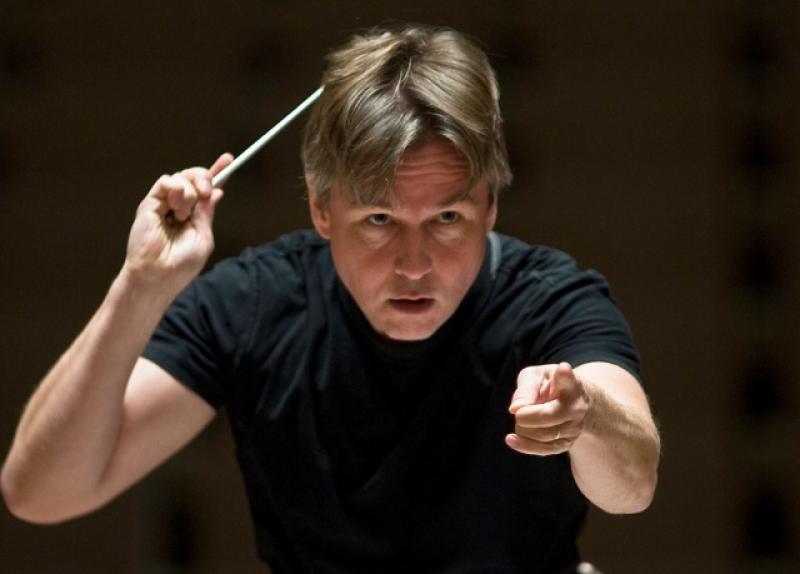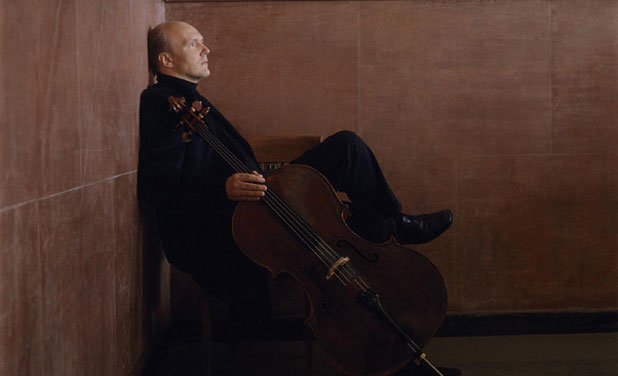Mørk, Philharmonia Orchestra, Salonen, Royal Festival Hall | reviews, news & interviews
Mørk, Philharmonia Orchestra, Salonen, Royal Festival Hall
Mørk, Philharmonia Orchestra, Salonen, Royal Festival Hall
Early Lutosławski trumps a later concerto, but Debussy's waves rise highest

Curious and curiouser. Lutosławski’s Cello Concerto, centrepiece of Esa-Pekka Salonen’s latest Philharmonia concert celebrating the Polish master’s centenary, adds ballast to the idea that the composer, like Schoenberg and Tippett, burrowed into a specially comfortless rabbit warren in his later works. On the other hand his Concerto for Orchestra, begun two decades earlier in 1950, proved its mettle as a serious audience-pleaser.
It’s probably coincidence: would Lutosławski really have known by then the two works he most evokes, the Sinfonia da Requiem – same doom-beating timpani and ground bass at the start – and Peter Grimes? There's even a Passacaglia like the one in Grimes to turn the screw in the third movement. At any rate the Brittenesque chains of pootling thirds, the innocence of which is so often drowned in eerie textures, apparently come not from childhood preoccupations but from Polish folksong (someone has probably cited the sources somewhere, but I’ve never seen anything but vague claims). And therein lies another clue: Lutosławski can be hugely engaging when using tunes that are not his own, but ideas in subsequent works often feel curiously amorphous.
 As they did in the Cello Concerto of 1970, despite pleading from the phenomenal Truls Mørk (pictured right by Morten Krogvold for Virgin Classics) which could not have been closer to the vocal, soliloquising spirit of Mstislav Rostropovich, Lutosławski’s inspiration. Yet neither the Russian, who played the work in one of his last major retrospectives with the LSO in this same hall, nor the Norwegian could convince us that the protagonist ever breaks free of his chrysalis, as he's supposed to; and if they couldn’t, no one can.
As they did in the Cello Concerto of 1970, despite pleading from the phenomenal Truls Mørk (pictured right by Morten Krogvold for Virgin Classics) which could not have been closer to the vocal, soliloquising spirit of Mstislav Rostropovich, Lutosławski’s inspiration. Yet neither the Russian, who played the work in one of his last major retrospectives with the LSO in this same hall, nor the Norwegian could convince us that the protagonist ever breaks free of his chrysalis, as he's supposed to; and if they couldn’t, no one can.
Gestures and sounds are fitfully arresting, – the nebulous gatherings of orchestral strings once the cellist has left off his meditations on a single note (mesmerisingly even in Mørk’s hands right at the start) or the shouty trumpets who warn us that this is going to be one of those familiar post-war battles between one huge personality and a brassy army. Yet you’d have to read the composer’s own cautious "programme" to Rostropovich to realise that it’s all supposed to go anywhere.
Salonen’s conducting mastery can be surprisingly feral these days. If his urgency made the outer-movement dynamism of the Concerto for Orchestra sometimes feel over-thick, and not always as well defined as a remarkable Barbican performance conducted by Yan Pascal Tortelier some years back, the press of every button in Debussy’s La Mer, one of Lutosławski’s many French inspirations, brought other squalls into focus. He resisted that temptation to succumb to opium-den haze which led another conductor’s performance to be once dubbed "Le lac".
In “From dawn to noon on the sea”, swimmers could happily bob in these buoyant waters from 10 to 11am. Divided cellos breezed in with unique clarity on the uptake; there were orgies among the middle-movement waves, and moderated blasts during the Panavision scope of the finale. As for that incredible refinement, home territory for Salonen, Lutosławski certainly learned from it, as his feathery, eerie Capriccio Notturno in the Concerto for Orchestra hauntingly told us. It’s a terrific tour de force, with some claims to uneasy depths; but when all the brilliance of the evening’s second half had paraded past, the pull of Debussy’s tides still proved the stronger.
- Final concert in the Philharmonia/Salonen Lutosławski series, Woven Words, is on Thursday 21 March
rating
Explore topics
Share this article
The future of Arts Journalism
You can stop theartsdesk.com closing!
We urgently need financing to survive. Our fundraising drive has thus far raised £49,000 but we need to reach £100,000 or we will be forced to close. Please contribute here: https://gofund.me/c3f6033d
And if you can forward this information to anyone who might assist, we’d be grateful.

Subscribe to theartsdesk.com
Thank you for continuing to read our work on theartsdesk.com. For unlimited access to every article in its entirety, including our archive of more than 15,000 pieces, we're asking for £5 per month or £40 per year. We feel it's a very good deal, and hope you do too.
To take a subscription now simply click here.
And if you're looking for that extra gift for a friend or family member, why not treat them to a theartsdesk.com gift subscription?
more Classical music
 Hallé John Adams festival, Bridgewater Hall / RNCM, Manchester review - standing ovations for today's music
From 1980 to 2025 with the West Coast’s pied piper and his eager following
Hallé John Adams festival, Bridgewater Hall / RNCM, Manchester review - standing ovations for today's music
From 1980 to 2025 with the West Coast’s pied piper and his eager following
 Kaploukhii, Greenwich Chamber Orchestra, Cutts, St James's Piccadilly review - promising young pianist
A robust and assertive Beethoven concerto suggests a player to follow
Kaploukhii, Greenwich Chamber Orchestra, Cutts, St James's Piccadilly review - promising young pianist
A robust and assertive Beethoven concerto suggests a player to follow
 Robin Holloway: Music's Odyssey review - lessons in composition
Broad and idiosyncratic survey of classical music is insightful but slightly indigestible
Robin Holloway: Music's Odyssey review - lessons in composition
Broad and idiosyncratic survey of classical music is insightful but slightly indigestible
 Classical CDs: Wolf-pelts, clowns and social realism
British ballet scores, 19th century cello works and contemporary piano etudes
Classical CDs: Wolf-pelts, clowns and social realism
British ballet scores, 19th century cello works and contemporary piano etudes
 Bizet in 150th anniversary year: rich and rare French offerings from Palazzetto Bru Zane
Specialists in French romantic music unveil a treasure trove both live and on disc
Bizet in 150th anniversary year: rich and rare French offerings from Palazzetto Bru Zane
Specialists in French romantic music unveil a treasure trove both live and on disc
 Scottish Chamber Orchestra, Ibragimova, Queen’s Hall, Edinburgh review - rarities, novelties and drumrolls
A pity the SCO didn't pick a better showcase for a shining guest artist
Scottish Chamber Orchestra, Ibragimova, Queen’s Hall, Edinburgh review - rarities, novelties and drumrolls
A pity the SCO didn't pick a better showcase for a shining guest artist
 Kilsby, Parkes, Sinfonia of London, Wilson, Barbican review - string things zing and sing in expert hands
British masterpieces for strings plus other-worldly tenor and horn - and a muscular rarity
Kilsby, Parkes, Sinfonia of London, Wilson, Barbican review - string things zing and sing in expert hands
British masterpieces for strings plus other-worldly tenor and horn - and a muscular rarity
 From Historical to Hip-Hop, Classically Black Music Festival, Kings Place review - a cluster of impressive stars for the future
From quasi-Mozartian elegance to the gritty humour of a kitchen inspection
From Historical to Hip-Hop, Classically Black Music Festival, Kings Place review - a cluster of impressive stars for the future
From quasi-Mozartian elegance to the gritty humour of a kitchen inspection
 Shibe, LSO, Adès, Barbican review - gaudy and glorious new music alongside serene Sibelius
Adès’s passion makes persuasive case for the music he loves, both new and old
Shibe, LSO, Adès, Barbican review - gaudy and glorious new music alongside serene Sibelius
Adès’s passion makes persuasive case for the music he loves, both new and old
 Anja Mittermüller, Richard Fu, Wigmore Hall review - a glorious hall debut
The Austrian mezzo shines - at the age of 22
Anja Mittermüller, Richard Fu, Wigmore Hall review - a glorious hall debut
The Austrian mezzo shines - at the age of 22
 First Person: clarinettist Oliver Pashley on the new horizons of The Hermes Experiment's latest album
Compositions by members of this unusual quartet feature for the first time
First Person: clarinettist Oliver Pashley on the new horizons of The Hermes Experiment's latest album
Compositions by members of this unusual quartet feature for the first time

Add comment